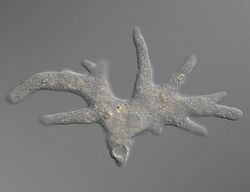Biology:Tubulinea
| Tubulinea | |
|---|---|

| |
| Amoeba proteus | |
| Scientific classification | |
| Domain: | Eukaryota |
| Phylum: | Amoebozoa |
| Subphylum: | Lobosa |
| Class: | Tubulinea Smirnov et al. 2005 |
| Subclasses & Orders | |
| |
The Tubulinea are a major grouping of Amoebozoa, including most of the more familiar amoebae genera like Amoeba, Arcella, Difflugia and Hartmannella.
Characteristics
During locomotion most Tubulinea have a roughly cylindrical form or produce numerous cylindrical pseudopods. Each cylinder advances by a single central stream of cytoplasm, granular in appearance, and has no subpseudopodia. This distinguishes them from other amoeboid groups, although in some members this is not the normal type of locomotion.
Classification
This class was anticipated by some biologists such as Jahn, who grouped all amoebae with granular pseudopodia together,[1] but most split the lobose amoebae into testate Testacealobosia and naked Gymnamoebia. These latter are polyphyletic, but molecular trees by Bolivar et al.[2] identified a core monophyletic subgroup. Subsequent studies showed the testate lobose amoebae belong to the same group, which was thus renamed Lobosea sensu stricto[3] or Tubulinea.[4]
Taxonomy
The class Tubulinea, as of 2022, is classified into three major groups: Corycida, Echinamoebida and Elardia. The most taxonomically abundant group is Elardia, which contains the testate amoebae of Arcellinida and the naked amoebae of orders Leptomyxida and Euamoebida.[5][6][7][8]
- Corycidia Kang et al. 2017
- Family Microcoryciidae de Saedeleer 1934
- Order Trichosida Moebius 1889
- Family Trichosphaeriidae Sheehan & Banner 1973
- Order Echinamoebida Cavalier-Smith 2004 em. 2011
- Family Vermamoebidae Cavalier-Smith & Smirnov 2011
- Family Echinamoebidae Page 1975
- Elardia Kang et al. 2017
- Order Leptomyxida Pussard & Pons 1976 em. Page 1987
- Family Flabellulidae Bovee & Jahn, 1967 ex Bovee 1970
- Family Gephyramoebidae Pussard & Pons 1976
- Family Leptomyxidae Goodey 1915
- Family Rhizamoebidae Smirnov et al. 2016
- Superorder Eulobosia Cavalier-Smith 2016
- Order Euamoebida Lepşi 1960 em. Cavalier-Smith 2016
- Family Nolandellidae Cavalier-Smith 2011
- Family Hartmannellidae Singh 1951 em. Smirnov et al. 2011
- Family Amoebidae (Ehrenberg 1838) Page 1987
- Order Arcellinida Kent 1880
- Suborder Phryganellina Bovee 1985
- Family Phryganellidae Jung 1942
- Family Cryptodifflugiidae Jung 1942
- Suborder Organoconcha Kosakyan et al. 2016
- Family Microchlamyiidae Ogden 1985
- Suborder Glutinoconcha Kosakyan et al. 2016
- Infraorder Volnustoma Kosakyan et al. 2016
- Family Heleoperidae Jung 1942
- Infraorder Hyalospheniformes Lahr et al. 2019
- Family Hyalospheniidae Schultze 1877 emend. Kosakyan & Lara 2012 [Nebelidae Taranek 1882]
- Infraorder Excentrostoma Lahr et al. 2019
- Family Centropyxidae Jung 1942 [incl. Plagiopyxidae]
- Infraorder Cylindrothecina González-Miguéns, Todorov, Blandenier, Porfirio-Sousa, Ribeiro, Ramos, Lahr & Lara 2022
- Family Cylindrifflugiidae González-Miguéns, Todorov, Blandenier, Porfirio-Sousa, Ribeiro, Ramos, Lahr & Lara 2022
- Infraorder Longithecina Kosakyan et al. 2016
- Family Lesquereusiidae [Paraquadrulidae Deflandre 1953]
- Family Difflugiidae Wallich 1864
- Infraorder Sphaerothecina Kosakyan et al. 2016
- Family Netzeliidae Kosakyan et al. 2016 [Cyclopyxidae Schönborn 1989]
- Family Arcellidae Ehrenberg 1832
- Infraorder Volnustoma Kosakyan et al. 2016
- Suborder Phryganellina Bovee 1985
- Order Euamoebida Lepşi 1960 em. Cavalier-Smith 2016
- Order Leptomyxida Pussard & Pons 1976 em. Page 1987
References
- ↑ Jahn; Bovee; Jahn (1979). How to know the protozoa. Wm. C. Brown Company Publishers. ISBN 0-697-04759-8. https://archive.org/details/howtoknowprotozo0000jahn.
- ↑ Bolivar, I.; Fahrni, J.F.; Smirnov, A.; Pawlowski, J. (2001). "SSU rRNA-based Phylogenetic Position of the Genera Amoeba and Chaos (Lobosea, Gymnamoebia): The Origin of Gymnamoebae Revisited". Molecular Biology and Evolution 18 (12): 2306–2314. doi:10.1093/oxfordjournals.molbev.a003777. PMID 11719580.
- ↑ Cavalier-Smith, T.; Chao, E.-Y; Oates, B. (2004). "Molecular phylogeny of the Amoebozoa and evolutionary significance of the unikont Phalansterium". European Journal of Protistology 40: 21–48. doi:10.1016/j.ejop.2003.10.001.
- ↑ Smirnov, A.V.; Nassonova, E.S.; Berney, C.; Fahrni, J.; Bolivar, I.; Pawlowski, J. (2005). "Molecular phylogeny and classification of the lobose amoebae". Protist 156 (2): 129–142. doi:10.1016/j.protis.2005.06.002. PMID 16171181.
- ↑ "Between a Pod and a Hard Test: The Deep Evolution of Amoebae". Molecular Biology and Evolution 34 (9): 2258–2270. September 2017. doi:10.1093/molbev/msx162. PMID 28505375.
- ↑ Adl, Sina M.; Bass, David; Lane, Christopher E.; Lukeš, Julius; Schoch, Conrad L.; Smirnov, Alexey; Agatha, Sabine; Berney, Cedric et al. (2018-09-26). "Revisions to the Classification, Nomenclature, and Diversity of Eukaryotes". Journal of Eukaryotic Microbiology 66 (1): 4–119. doi:10.1111/jeu.12691. PMID 30257078.
- ↑ Lahr, Daniel J.G.; Kosakyan, Anush; Lara, Enrique; Mitchell, Edward A.D.; Morais, Luana; Porfirio-Sousa, Alfredo L.; Ribeiro, Giulia M.; Pánek, Tomáš et al. (2019). "Phylogenomics and Morphological Reconstruction of Arcellinida Testate Amoebae Highlight Diversity of Microbial Eukaryotes in the Neoproterozoic". Current Biology 29 (6): 991–1001. doi:10.1016/j.cub.2019.01.078.
- ↑ González-Miguéns, Rubén; Todorov, Milcho; Blandenier, Quentin; Duckert, Clément; Porfirio-Sousa, Alfredo L.; Ribeiro, Giulia M.; Ramos, Diana; Lahr, Daniel J.G. et al. (2022). "Deconstructing Difflugia: The tangled evolution of lobose testate amoebae shells (Amoebozoa: Arcellinida) illustrates the importance of convergent evolution in protist phylogeny". Molecular Phylogenetics and Evolution 175: 107557. doi:10.1016/j.ympev.2022.107557. ISSN 1055-7903. PMID 35777650.
Wikidata ☰ Q146300 entry
 |





